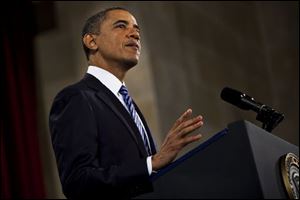
President asks execs to invest in economy
Obama: Business, feds share burden
2/8/2011
The President speaks Monday to the U.S. Chamber of Commerce, which has opposed most of the president's health-care and banking agenda.
"If there is a reason you don't believe that this is the time to get off the sidelines — to hire and invest — I want to know about it. I want to fix it," Mr. Obama said in a speech to business leaders at the U.S. Chamber of Commerce.
In the speech, Mr. Obama pledged to eliminate unneeded regulations and simplify the tax code, but said companies had responsibilities to help the economy recover.
"Ultimately, winning the future is not just about what the government can do to help you succeed," he said. "It's about what you can do to help America succeed."
The President's comments came as he sought to reassure members of the business community that he was not their adversary and to mend fences with their forceful lobbying advocate in Washington.
"I'm here in the interest of being more neighborly," Mr. Obama said, alluding to the contentious relationship he has had with the Chamber of Commerce over the past two years. "I strolled over from across the street, and, look, maybe if we had brought over a fruitcake when I first moved in, we would have gotten off to a better start."
When the laughter ended, Mr. Obama departed from his prepared text to add: "But I'm going to make up for it."
The chamber has opposed most of Mr. Obama's health-care and banking agenda and spent more than $50 million during last year's midterm elections to cast the President and his party as anti-business and a threat to capitalism.
But the chamber, too, is eager to tone down the rhetoric, according to senior officials there. At the height of the high-profile fight with the White House, several big-name companies left its board, citing concern about the chamber's opposition to the administration's efforts.
Thomas Donohue, the Chamber of Commerce's president, has in the past warned of a "regulatory tsunami" that will result from Mr. Obama's policies. In particular, he told reporters after the November elections that the health-care law would produce hundreds of new burdens on U.S. businesses.
But in introducing Mr. Obama, Mr. Donohue emphasized his group's desire to work with the administration in areas where they might agree. Those include increasing free trade and exports, investing in technology and infrastructure, and reducing the nation's debt.
"I reaffirm the American business community's absolute commitment to working with you and your administration to advancing our shared priorities," Mr. Donohue said.
Mr. Obama told the business lobby about the executives who have important roles in his administration: JPMorgan's Bill Daley, GE's Jeff Immelt, and AOL's Steve Case. "We need to make America the best place on Earth to do business," the President promised.
Let's get rid of those "outdated and unnecessary regulations," the one-time corporate scold said, and remove that "burdensome corporate tax code with one of the highest rates in the world."
The President boasted that his administration had slowed down environmental rule-making and accelerated drug approvals.
Mr. Obama's remarks reflected the careful effort of a White House eager to seem more pro-business but anxious about the accusations of betrayal by some of the Democratic President's most liberal allies.
The President's message to the business community — "I get it," he said of the profit-making imperative — was joined with an admonition that corporate America must feel some sense of duty as well. That effort to walk a political line appeared to please neither side completely.
Mr. Obama's suggestion that businesses can help the economy recover by spending reserves was met with skepticism by some in the audience. Harold Jackson, an executive at Buffalo Supply Inc., a medical supply company, called it naïve.
"Any business person has to look at the demand to their company for their product and services, and make hiring decisions," Mr. Jackson said. "I think it's a little outside the bounds to suggest that if we hire people we don't need, there will be more demand."
Sen. Mitch McConnell of Kentucky, the Republican leader in the Senate, said in remarks yesterday that "we'll just have to wait and see whether the administration's actions support its rhetoric."
Mr. Obama's decision to address the chamber in the first place has upset liberal groups, who say the President is consorting with the very forces they believe have worked to undercut his policies.
Public Citizen, a liberal group in Washington, issued a statement condemning the President's comment that he would "go anywhere" in the world to promote trade, a line that prompted one of the few moments of applause from the crowd of business leaders.
The Washington Post contributed to this report.